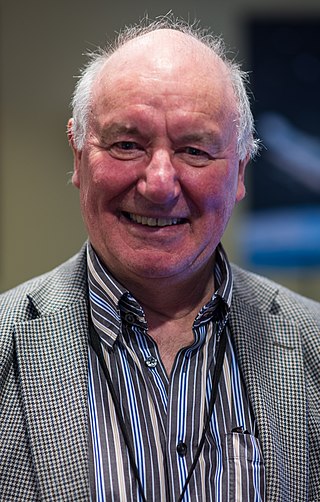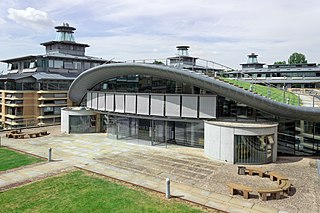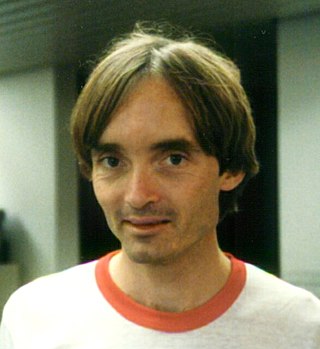
John David Barrow was an English cosmologist, theoretical physicist, and mathematician. He served as Gresham Professor of Geometry at Gresham College from 2008 to 2011. Barrow was also a writer of popular science and an amateur playwright.

Malcolm Sim Longair is a British physicist. From 1991 to 2008 he was the Jacksonian Professor of Natural Philosophy in the Cavendish Laboratory at the University of Cambridge. Since 2016 he has been Editor-in-Chief of the Biographical Memoirs of Fellows of the Royal Society.

Dennis William Siahou Sciama, was an English physicist who, through his own work and that of his students, played a major role in developing British physics after the Second World War. He was the PhD supervisor to many famous physicists and astrophysicists, including John D. Barrow, David Deutsch, George F. R. Ellis, Stephen Hawking, Adrian Melott and Martin Rees, among others; he is considered one of the fathers of modern cosmology.

The Faculty of Mathematics at the University of Cambridge comprises the Department of Pure Mathematics and Mathematical Statistics (DPMMS) and the Department of Applied Mathematics and Theoretical Physics (DAMTP). It is housed in the Centre for Mathematical Sciences site in West Cambridge, alongside the Isaac Newton Institute. Many distinguished mathematicians have been members of the faculty.

Carlos Silvestre Frenk is a Mexican-British cosmologist. Frenk graduated from the National Autonomous University of Mexico and the University of Cambridge, and spent his early research career in the United States, before settling permanently in the United Kingdom. He joined the Durham University Department of Physics in 1986 and since 2001 has served as the Ogden Professor of Fundamental Physics at Durham University.
Peter Coles is a theoretical cosmologist at Maynooth University. He studies the large scale structure of our Universe.
Henry Keith Moffatt, FRS FRSE is a British mathematician with research interests in the field of fluid dynamics, particularly magnetohydrodynamics and the theory of turbulence. He was Professor of Mathematical Physics at the University of Cambridge from 1980 to 2002.

The Department of Physics and Astronomy at the University of Manchester is one of the largest and most active physics departments in the UK, taking around 250 new undergraduates and 50 postgraduates each year, and employing more than 80 members of academic staff and over 100 research fellows and associates. The department is based on two sites: the Schuster Laboratory on Brunswick Street and the Jodrell Bank Centre for Astrophysics in Cheshire, international headquarters of the Square Kilometre Array (SKA).

William James Stirling was a physicist who served as the first Provost of Imperial College London. He was appointed to this role in August 2013 and retired in August 2018.

David Ian Olive ; 16 April 1937 – 7 November 2012) was a British theoretical physicist. Olive made fundamental contributions to string theory and duality theory, he is particularly known for his work on the GSO projection and Montonen–Olive duality.
Timothy John Pedley is a British mathematician and a former G. I. Taylor Professor of Fluid Mechanics at the University of Cambridge. His principal research interest is the application of fluid mechanics to biology and medicine.

Vinod Johri was an Indian astrophysicist. He was an eminent cosmologist, a retired professor of astrophysics at Indian Institute of Technology, Madras and an emeritus professor at Lucknow University since 1995. Johri had over 75 research publications and articles published in pioneering journals. His major contributions in cosmological research included 'power law inflation, genesis of quintessence fields of dark energy and phantom cosmologies'. He was the co-author of the first model of power law inflation in Brans–Dicke theory along with C. Mathiazhagan. He was honored by Uttar Pradesh Government by Research Award of the Council of Science & Technology (CSIR).
David Tong is a British theoretical physicist. He is a professor at the University of Cambridge, working in the Department of Applied Mathematics and Theoretical Physics (DAMTP). He is also a fellow of Trinity College, Cambridge. His research mainly concerns quantum field theory. He is the joint recipient of the 2008 Adams Prize and is currently a Simons Investigator. He is also known for his outreach activities and for his freely available lecture notes covering a wide range of topics in physics.

Robert H. Brandenberger is a Swiss-Canadian theoretical cosmologist and a professor of physics at McGill University in Montreal, Quebec, Canada.
Anne-Christine Davis is a British theoretical physicist at the University of Cambridge. She was the first woman to be appointed a professor in the Faculty of Mathematics at the University. Her research mainly concerns cosmology, astrophysics and string theory.

Michael Richard Edward Proctor is a British physicist, mathematician, and academic. He is Professor of Astrophysical Fluid Dynamics at the University of Cambridge and, since his election in 2013, the Provost of King's College, Cambridge and school governor at Eton College.
Michael Grae Worster is a British fluid dynamicist at the University of Cambridge. He is a professor at the Department of Applied Mathematics and Theoretical Physics and a Fellow of Trinity College, Cambridge. Since 2007, he has been the editor-in-chief of the Journal of Fluid Mechanics. He is also an associate faculty member of the African Institute for Mathematical Sciences. In 2006, he was elected Fellow of the American Physical Society and of the European Mechanics Society.
Philippa K. Browning is a Professor of Astrophysics in the Jodrell Bank Centre for Astrophysics at the University of Manchester. She specialises in the mathematical modelling of fusion plasmas.

Anna Margaret Mahala Scaife is a Professor of Radio Astronomy at the University of Manchester and Head of the Jodrell Bank Centre for Astrophysics Interferometry Centre of Excellence. She is the co-director of Policy@Manchester. She was awarded the 2019 Royal Astronomical Society Jackson-Gwilt Medal in recognition of her contributions to astrophysical instrumentation.
Ana Achúcarro Jiménez is a Spanish researcher, academic, and professor of particle astrophysics and quantum field theory at the University of Leiden in Leiden, Netherlands. Her research considers the early universe, supergravity, black holes and solitons.











